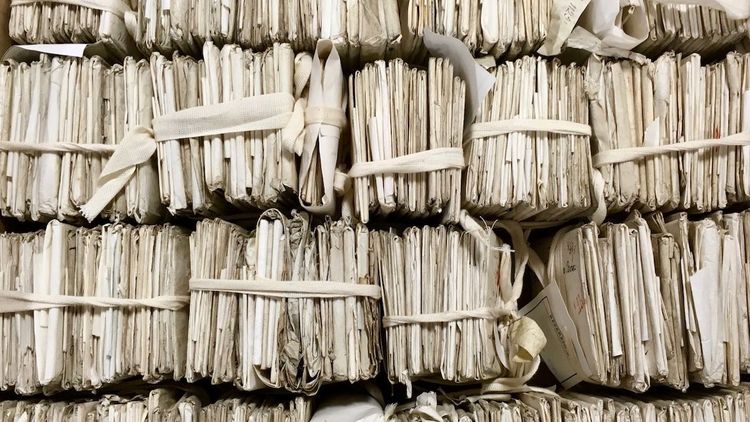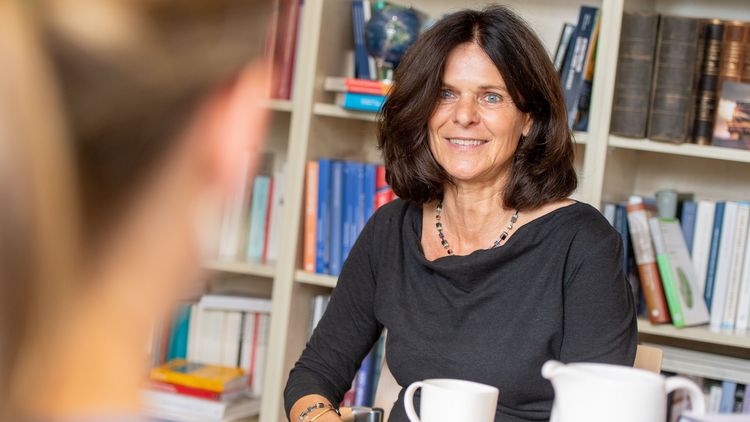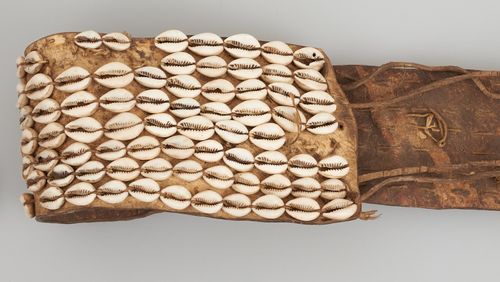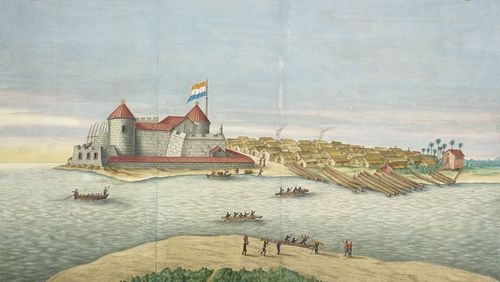Hundreds of thousands of documents from the period between 1650 and 1815, long forgotten and for the most part unsorted, are the focus of the Prize Papers Project. Scientific director Dagmar Freist about new insights into historical complexities.
You have been working on the Prize Papers for almost a decade, not just since the official start of the project within the German Academies Programme in 2018. Do you still make surprise discoveries when you're exploring the collection?
DAGMAR FREIST: Absolutely! Because this collection is very extensive in terms of numbers and content. We're not just talking about some 160,000 letters, but about almost 90 different types of document that are stored together with the letters in more than 4,000 boxes. Depending on the document, context, time, place and actors involved, the historical constellations change constantly and provide us with new insights, for example into people's experiences of migration, illness, or slavery in the 17th and 18th centuries and at the start of the 19th century.
Ninety different types of document – that seems like a lot. Can you give a few examples, apart from the frequently mentioned letters?
FREIST: The letters are indeed the best-known part of the collection – less well known, for example, are the precursors of today's vaccination certificates, known as "bills of health". Back then, these certificates were used as an instrument for pandemic control: when a ship was approaching a port, the crew had to present proof that it was not carrying infectious diseases. In addition, the Prize Papers collection contains various types of legal documents: after all, the collection held by the National Archives in London originated during the trials over ships captured between 1652 and 1815, when seizing enemy ships was legal in wartime and the captures were subject to review by the High Court of Admiralty. These documents include writs of appeal, for example by merchants objecting to the confiscation of their goods during a ship's capture and claiming neutrality. And also bills of lading and other such documents that were presented as evidence in court. We had to classify many of the documents ourselves first, because we're not necessarily familiar with all the different types, especially given that they are written in different languages.
You like to describe the Prize Papers as a “treasure trove". In what way could they change our perception of the early modern period?
FREIST: In my view they offer us the chance to change our perspective. Because here, the great upheavals of European expansion - colonialism, but also poverty-driven migration - are depicted from an everyday perspective that includes social groups from which we normally have no testimonials. So our knowledge is not necessarily called into question, but it becomes far more complex. We traditionally approach this expansion from a political or administrative perspective, and then there's the odd travel journal or missionaries' report that has been handed down in archives and sorted accordingly. By contrast, the Prize Papers offer material about the everyday effects of expansion – material that has not been kept because an archive considered it worth preserving, and that allows other voices to have their say.
A completely accidental legacy.
FREIST: Yes, it shows that this era cannot be understood solely from a national-historical perspective – the perspective of Portuguese, Spanish, French, English or Dutch colonial history. Instead, we see that transversely to these national affiliations, people were involved in the events of the time for all kinds of motives. These were not rulers or members of the administration, but traders or people who moved to the New World driven by poverty, but who nonetheless had to engage in some way with the social and authoritarian structures of the time.
So the letters show us new levels of this complex expansion process.
FREIST: They show us this complexity – and what it was like to migrate to these regions on one's own initiative. In addition, we see that at the everyday level some societies which, at least at the time, did not belong to the colonial powers were also part of this expansion – for example territories of the Holy Roman Empire of the German Nation, whether it was through German traders, seafarers, military doctors or, crucially, through missionaries. It follows that this expansion and colonial history is not just part of the history of the colonial powers of the time, but also part of our own cultural memory and the reappraisal of our own past.
That makes me think of the concept of globalization. Was this the start of that process?
FREIST: Researchers talk of "protoglobalization", and, indeed, cite European expansion as an example. In doing so, we must be aware though that seeing European expansion as the beginning of globalization is a very Eurocentric way of looking at things. Outside Europe, for example in the regions in and around the Indian Ocean, the various ethnicities and places of origin had been intertwined through trade and migration since as early as the 9th century. Among European scholars, the idea of globalization is mainly associated with the 19th, 20th and 21st centuries, and very much with today's Western global players. For a long time, historians did not associate the encounters, and also confrontations, that took place below this level at a much earlier stage with the concept of globalization. The Prize Papers contribute to giving us a more nuanced picture.
Many of the estimated 160,000 letters in the collection never reached their addressees. Out of those you have been able to read so far, can you pick out one that you found particularly moving?
FREIST: A letter written by a Moravian Church missionary, Catharina Borck, comes to mind: having just arrived in Suriname in 1795, she describes how she is introduced to plantation society. She writes about how the enslaved people, who were taken from Africa's west coast to the Caribbean under inhumane conditions, are put to work in her daily environment, including in the small shop she runs with her husband. She describes how they speak and the rituals they observe, for example when someone has died. A scene from one of Catharina Borck's first visits to a plantation engraved itself in my memory: the owner of the plantation is preparing a very special spectacle, as he calls it, which the guests must not miss – as darkness falls, the enslaved workers are led into the courtyard and made to crush the coffee beans in front of everyone.
And this was supposed to be entertainment for the guests.
FREIST: The description of this scene through the eyes of the missionary is so irritating from today's perspective because she doesn't seem to grasp the blatant oppression and slave labour that are being presented to the onlookers almost as if this were a stage production. Instead, she compares the rhythmic movements of stomping onto the coffee beans with the drilling of soldiers in Europe. Yet the Moravian Church missionaries had an ambivalent attitude towards slavery. This example shows how challenging it is to contextualize this kind of legacy and compare it with other accounts in order to get a picture of the common perception and practice of slavery by Europeans from all kinds of different backgrounds and levels of education. This perspective needs to be complemented by the perspectives, agency and narratives of those who were enslaved. In this respect, researchers still have a lot of catching up to do.
Your plan is to index and digitize this mass of documents over the project's 20-year funding period, and international experts have recently given it a positive assessment. How does the team proceed with a collection of this size? Box by box, or naval war by naval war – after all, there were 14 of them?
FREIST: We are indeed using a modular approach, naval war by naval war, and making decisions on a pragmatic basis: What is the scope? What are the language requirements? Which team member is best suited to the task at hand? Deciding which module to work on next is a complex process – always taken with the goal of making the best possible use of the resources. We face this challenge in close consultation with the National Archives, which pre-sorts the materials.
What is the next milestone?
FREIST: Our data portal. It has been in the test phase since the end of 2020 and the project team is already using it internally. The portal goes online at the end of September, so anyone who is interested will be able to research a preliminary selection of the documents catalogued up to that point. A second version of the data portal, which we are currently developing together with our IT cooperation partners at the Verbundzentrale des Gemeinsamen Bibliotheksverbunds (the common library network of seven German states), will also depict the connections between the documents and artefacts and the persons concerned – an even more complex data structure. At the same time, it remains important to us to ensure that our approach restricts access to the material as little as possible. In addition to specific browsing options, it will also be possible to conduct free searches. Always being open to surprises – that's extremely important in the process of discovery.
Interview: Deike Stolz







